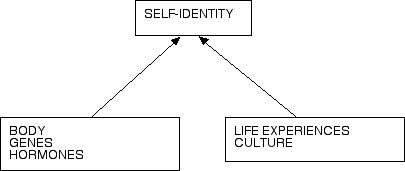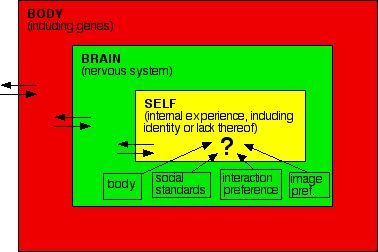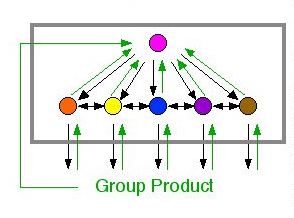gender = culture
identity = ?

"self" is influenced by both and is a contributor to both
both "sex" AND "gender" are "social constructs"; so too are both "biology" and "culture"
Biology (like all science) doesn't answer questions (or solve problems) but it may (depending on one's degree of familiarity with it and other aspirations/commitments) provide observations and perspectives that are novel and useful for developing improved stories about particular phenomena (including sex and gender?). As is the case with all story-generating systems, biology (and science) creates risks as well as benefits in this regard. Appropriately used, perhaps it can contribute to rectifying existing problems? Remember though that, at all times, science is not about about "Truth" or "facts", it is about observations and stories that summarize them in an assailable way and, in so doing, suggest new ways of thinking about things and raise new questions.
Some relevant areas re "sex and gender":
| Did material body in first session. Some reactions from forum ... then move on to development, evolution this session? |
Recapitulation: Thinking biologically about body/culture/self ...
| A starting place | Adding a biological perspective | |
|---|---|---|
|
sex = biology gender = culture identity = ? | 
| "culture" is not independent of "biology" nor "biology" of "culture" "self" is influenced by both and is a contributor to both both "sex" AND "gender" are "social constructs"; so too are both "biology" and "culture" |

| 
|
| >> 16 "sex/genders" 2 sex/genders is NOT a biological concept, where does it come from? | "self" is product of and contributor to diverse components of unconscious
culture is product of and contributor to diverse individuals |
|
maybe there is no unchanging set of morals that exists in an essential realm, but can there be a changing set of morals that exists WITHIN history? that change with us? a biologist would still say no because there is no realm outside of bodied experience? ... this idea does not assuage the fear imbeded in the notion that there is no essential moral realm: it's scary to think that hundreds of years ago a man could feel entitled to rape his wife: it negates the humanist theory that there is an internal set of morals that EVERY human embodies and relates to as an individual ... but does the idea of evolving morals outside of bodied experience work? ... Orah I really like and agree with [the] view that all experience is embodied and encultured, and thus all human experience is mediated and affected by both the physical body and the culture in which that body developed and resides. Paul also seemed to be arguing that there is no such thing as 'truth' in the absolute, floating-outside-of-subjective-experience sense, which makes a lot of sense to me. In a reading for a class on culture, I found a quote from Max Weber: "Man is a creature suspended in webs of significance which he himself has spun" (this may not be the exact quote, apologies). Thus, if we are suspended in these webs of culture as created by our embodied selves, Paul seems to be saying that these webs hang in a vacuum: there is nothing free-floating outside the web. The one problem this leaves me with is that Paul claims that even all this theory is merely a story. Where are we left if there is no truth? How can we establish ground upon which to build our understandings of the world--assuming that truth is not a valid ground upon which to stand? Could we instead, perhaps, define 'truth' as a variable social construct, and then build on our truths while recognizing their constructedness? ... Amy the muddling of the intersection of gender identity and sexual orientation ... Anne Is "body" really only genitals? How do hormones or something else about brain chemistry that might be "telling" people who they "are" fit in to this model ... As an anthropologist, I am always loathe to attribute much of anything about people's experience to biology in any strict sense -- I tend to think of the pre-cultured body more as a set of potentials and constraints than as a direct determinant of any *particular* sense of identity -- but it is difficult to deny that people's bodies seem to be "telling" them something from the "inside" about their sex/gender. Yet this seems to go far beyond genitals. ... Jennifer I guess I don't understand why interaction preference is a signal that dictates my sex. I see my interaction preference as a part of sexuality, which is not necessarily related to sex ... Sarah i dont understand how all four of the categories paul presented can hold equal weight when determining sex ... Alex what i found is that "brain-boxes" becomes too confining. i had this thought about dropping rocks into water (all that rain over break, i guess)...and each rock makes its own set of ripples, right? so, i started thinking about the brain as a series of circles within each other, and these circles cause more circles (ripples) which then intersect with other circle-ripples, causing feedback and interference and growth ... Em when we realize that a category doesn't work and we, therefore, make the category more and more specific, and finally find ourselves alone in the category ...("I'm the REAL hermaphrodite!") ... have we returned to a space bf the initial categorization? how are we different after wording ourselves out of category? ... Orah what I feel problematic is the notion of disabilty. I apologize for always going back that idea, but it's just something I find very interesting and extremely relevant to gender studies as well. If Paul's "story" is stipulating that the brain dictates everything we know about our self, then is he also saying that the condition that the brain is in will dictate the kind of self--as to claim that if someone is mentally disabled, their "self" would constructed out of that disability and, rather, constrained by the disabled mind. Does that ultimately lead to a disabling view of self? Is it possible to have a non-disabled self from a disabled mind? Also, how about in terms of mental illness, are those afflicted with that sort of illness still able to find their "self" through their brain--or does that make them "ineligible" of some sort? Does one's version of "self" have to coincide with reality? ... Patricia |
A specific case: homosexuality
Why are there variants? (What is a "disability"? ... From whence derives "morality"?)
The story of sex
| Social construction | Biological observations/story |
|---|---|
| Nature is imperfect, needs to be put "right" by human beings Social coherence requires individuals to be shaped to fit culture Sex is for reproduction The objective is reproductive success | Humans are one small part of a large and continuing exploration of possibilities So too is are human cultures Sex facilitates exploration The objective is exploration |
Might in fact be a way of counteracting "existing systemic violence" not only re homosexuality, and re sex/gender variation in general but also re the whole host of other forms of oppressive "hierarchy"? Thanks to all for contributions to this particular story. Would love to know what you think of it, have you assail it and/or contribute to its further development. One last set of thoughts in the on-line forum, please?
Thanks, all for engagement. Sorry we didn't have time to get to disability and morality; see links in notes for where this might have gone. Much appreciative of where we did go, some things tha stick in my mind ...
|